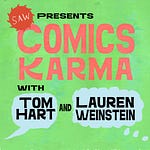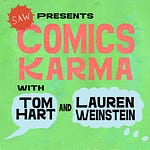In this week's episode of The Terrible Anvil we talked about pitching your work—whether short-form comics or book proposals—and getting published as a comics artist.
Some really great ideas from the chat that we hope to touch on in episode seven (a sort of sequel, with maybe more of a focus on BOOK pitching.)
Tom mentioned the expectations of what a book contract or publishing project will do for us
Sally mused: If we're not bankable, maybe we're MORE relevant.
Tom shared a link to CHILL SUBS, where you can look for places that publish short comics:
https://www.chillsubs.com/
and spoke about the FLOW anthology pitching process (theme relevance, no pay, a round of roughs and finishes with some small edits)
Alison Kent also had a good point on networking versus making real connections:
I think it was Jay Sherer or Caleb Monroe said that building relationships -- friendships, not networking necessarily -- is key. Share info, refer your friends. They said it was the most important thing
Some Quick Tips on Cold Emails (or DM-ing art directors)
1) Write a letter.
2) Be a fan of the editor’s work!
3) Be authentic, "might like my work, or I’m working on a book, maybe we can work together" etc
4) Share your work via URL to website or previously published work (not PDFs or JPGs unless they ask)
Remember: *Be polite, be brief, but no need to undersell your stuff or apologize!*
Alison also shared: Sharing your pitch ideas with friends seems to be a great way to focus your pitch
Sally remembered: Emil Wilson said in an Sunday Open Studios conversation something really helpful to me. Rather than seeing a call (for entries) and trying to generate an idea, it's easier to if the call reminds you of something that you have already come up with. So it makes all that stuff we create without obvious goals is resource building.
Jim had a great comment: Pitching as a nobody is a challenge. I feel like I have to create a resume (so to speak) before I have enough credibility to be considered as an actual cartoonist. The SAW themed anthologies are helpful in building a reputation.
Sally and Leonie were also wondering if the pitch should include the 'end' or the 'why' for the comic, what was learned in the process of investigating the topic of the work, etc. I find I leave that stuff out for short form pitches, and include it in book proposals.
Jim also said: I would be interested in hearing what others are doing to promote their self-published work. In one sense, I feel like the actress in La La Land who stages a one-women show, which she feels is a total disaster until it turns out that there was a Hollywood casting director in the audience. I'm hoping that a talk I give to a handful of people at a library or senior center might turn into something like that. A guy can dream, right?
Sally also said this:
It's good to try to frame the experience as offering something of value rather than begging for support/validation/etc.
And stay tuned for even MORE ABOUT PITCHING in next week's episode!

















Share this post